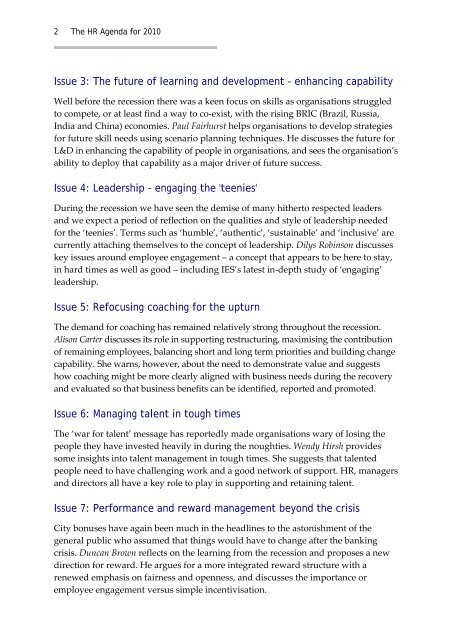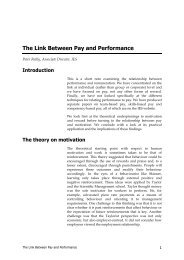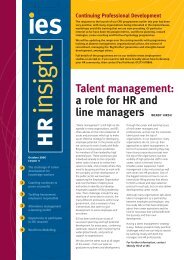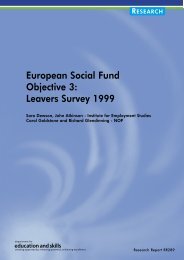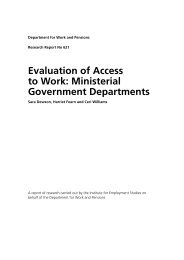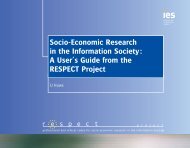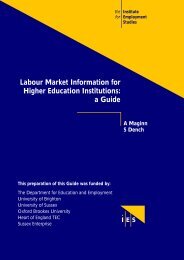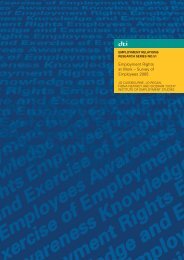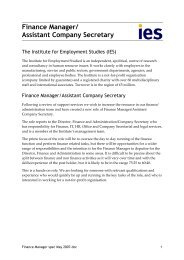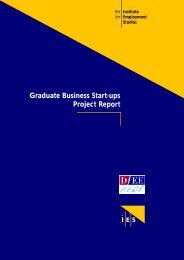PDF of this item - The Institute for Employment Studies
PDF of this item - The Institute for Employment Studies
PDF of this item - The Institute for Employment Studies
- No tags were found...
You also want an ePaper? Increase the reach of your titles
YUMPU automatically turns print PDFs into web optimized ePapers that Google loves.
2 <strong>The</strong> HR Agenda <strong>for</strong> 2010Issue 3: <strong>The</strong> future <strong>of</strong> learning and development – enhancing capabilityWell be<strong>for</strong>e the recession there was a keen focus on skills as organisations struggledto compete, or at least find a way to co‐exist, with the rising BRIC (Brazil, Russia,India and China) economies. Paul Fairhurst helps organisations to develop strategies<strong>for</strong> future skill needs using scenario planning techniques. He discusses the future <strong>for</strong>L&D in enhancing the capability <strong>of</strong> people in organisations, and sees the organisation’sability to deploy that capability as a major driver <strong>of</strong> future success.Issue 4: Leadership – engaging the 'teenies'During the recession we have seen the demise <strong>of</strong> many hitherto respected leadersand we expect a period <strong>of</strong> reflection on the qualities and style <strong>of</strong> leadership needed<strong>for</strong> the ‘teenies’. Terms such as ‘humble’, ‘authentic’, ‘sustainable’ and ‘inclusive’ arecurrently attaching themselves to the concept <strong>of</strong> leadership. Dilys Robinson discusseskey issues around employee engagement – a concept that appears to be here to stay,in hard times as well as good – including IES’s latest in‐depth study <strong>of</strong> ‘engaging’leadership.Issue 5: Refocusing coaching <strong>for</strong> the upturn<strong>The</strong> demand <strong>for</strong> coaching has remained relatively strong throughout the recession.Alison Carter discusses its role in supporting restructuring, maximising the contribution<strong>of</strong> remaining employees, balancing short and long term priorities and building changecapability. She warns, however, about the need to demonstrate value and suggestshow coaching might be more clearly aligned with business needs during the recoveryand evaluated so that business benefits can be identified, reported and promoted.Issue 6: Managing talent in tough times<strong>The</strong> ‘war <strong>for</strong> talent’ message has reportedly made organisations wary <strong>of</strong> losing thepeople they have invested heavily in during the noughties. Wendy Hirsh providessome insights into talent management in tough times. She suggests that talentedpeople need to have challenging work and a good network <strong>of</strong> support. HR, managersand directors all have a key role to play in supporting and retaining talent.Issue 7: Per<strong>for</strong>mance and reward management beyond the crisisCity bonuses have again been much in the headlines to the astonishment <strong>of</strong> thegeneral public who assumed that things would have to change after the bankingcrisis. Duncan Brown reflects on the learning from the recession and proposes a newdirection <strong>for</strong> reward. He argues <strong>for</strong> a more integrated reward structure with arenewed emphasis on fairness and openness, and discusses the importance oremployee engagement versus simple incentivisation.


